« Return to all search results
Title Search Results
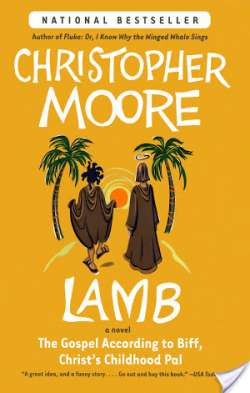
The birth of Jesus has been well chronicled, as have his glorious teachings, acts, and divine sacrifice after his thirtieth birthday. But no one knows about the early life of the Son of God, the missing years -- except Biff, the Messiah's best bud, who has been resurrected to tell the story in the divinely hilarious yet heartfelt work "reminiscent of Vonnegut and Douglas Adams" (Philadelphia Inquirer). Verily, the story Biff has to tell is a miraculous one, filled with remarkable journeys, magic, healings, kung fu, corpse reanimations, demons, and hot babes. Even the considerable wiles and devotion of the Savior's pal may not be enough to divert Joshua from his tragic destiny. But there's no one who loves Josh more -- except maybe "Maggie," Mary of Magdala -- and Biff isn't about to let his extraordinary pal suffer and ascend without a fight.
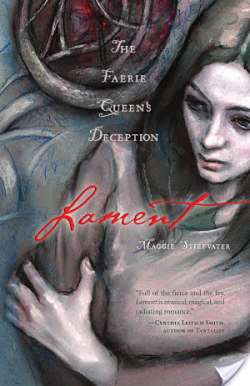
Sixteen-year-old Deirdre Monaghan is a music prodigy, who’s about to find out she can see faeries. Two mysterious (and cute) guys enter her life. Trouble is, Luke is a soulless faerie assassin and Aodhan is a dark faerie soldier. Their orders from the Faerie Queen? Kill Deirdre.
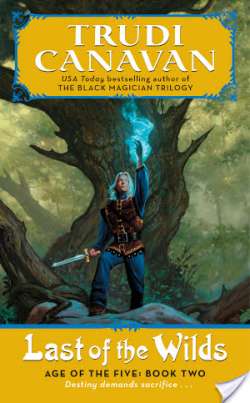
After pitched battle, The White—the avatars of the Five Gods—have briefly turned back the vicious invaders. And now, the priestess Auraya is sent on an urgent mission to reconcile with the powerful, outcast Dreamweavers, for their magical healing abilities may be the key to saving the land. But as a deadly plague devastates their allies and old adversaries resurface, a dreadful surprise may ruin the chance for peace. For Auraya's terrible discovery will force her into a desperate choice—one whose consequences will change the world forever.
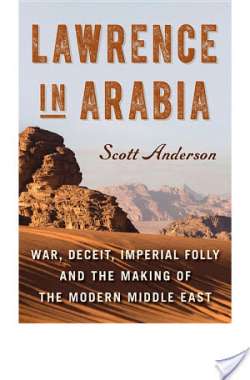
NAMED ONE OF THE BEST BOOKS OF THE YEAR BY New York Times • Christian Science Monitor • NPR • Seattle Times • St. Louis Dispatch National Book Critics Circle Finalist -- American Library Association Notable Book A thrilling and revelatory narrative of one of the most epic and consequential periods in 20th century history – the Arab Revolt and the secret “great game” to control the Middle East The Arab Revolt against the Turks in World War One was, in the words of T.E. Lawrence, “a sideshow of a sideshow.” Amidst the slaughter in European trenches, the Western combatants paid scant attention to the Middle Eastern theater. As a result, the conflict was shaped to a remarkable degree by a small handful of adventurers and low-level officers far removed from the corridors of power. Curt Prüfer was an effete academic attached to the German embassy in Cairo, whose clandestine role was to foment Islamic jihad against British rule. Aaron Aaronsohn was a renowned agronomist and committed Zionist who gained the trust of the Ottoman governor of Syria. William Yale was the fallen scion of the American aristocracy, who traveled the Ottoman Empire on behalf of Standard Oil, dissembling to the Turks in order gain valuable oil concessions. At the center of it all was Lawrence. In early 1914 he was an archaeologist excavating ruins in the sands of Syria; by 1917 he was the most romantic figure of World War One, battling both the enemy and his own government to bring about the vision he had for the Arab people. The intertwined paths of these four men – the schemes they put in place, the battles they fought, the betrayals they endured and committed – mirror the grandeur, intrigue and tragedy of the war in the desert. Prüfer became Germany’s grand spymaster in the Middle East. Aaronsohn constructed an elaborate Jewish spy-ring in Palestine, only to have the anti-Semitic and bureaucratically-inept British first ignore and then misuse his organization, at tragic personal cost. Yale would become the only American intelligence agent in the entire Middle East – while still secretly on the payroll of Standard Oil. And the enigmatic Lawrence rode into legend at the head of an Arab army, even as he waged secret war against his own nation’s imperial ambitions. Based on years of intensive primary document research, LAWRENCE IN ARABIA definitively overturns received wisdom on how the modern Middle East was formed. Sweeping in its action, keen in its portraiture, acid in its condemnation of the destruction wrought by European colonial plots, this is a book that brilliantly captures the way in which the folly of the past creates the anguish of the present.
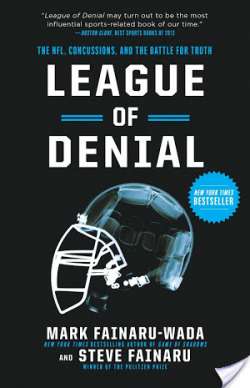
Draws on interviews, e-mails, and previously undisclosed documents to reveal how the NFL has endeavored to cover up evidence of the connection between football and brain damage for the past two decades.
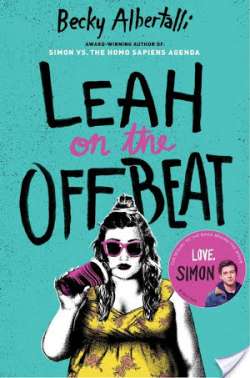
In this sequel to the acclaimed Simon vs. the Homo Sapiens Agenda—now a major motion picture, Love, Simon—we follow Simon’s BFF Leah as she grapples with changing friendships, first love, and senior year angst. When it comes to drumming, Leah Burke is usually on beat—but real life isn’t always so rhythmic. She’s an anomaly in her friend group: the only child of a young, single mom, and her life is decidedly less privileged. She loves to draw but is too self-conscious to show it. And even though her mom knows she’s bisexual, she hasn’t mustered the courage to tell her friends—not even her openly gay BFF, Simon. So Leah really doesn’t know what to do when her rock-solid friend group starts to fracture in unexpected ways. With prom and college on the horizon, tensions are running high. It’s hard for Leah to strike the right note while the people she loves are fighting—especially when she realizes she might love one of them more than she ever intended.

Adam Gordon is a brilliant, if highly unreliable, young American poet on a prestigious fellowship in Madrid, struggling to establish his sense of self and his relationship to art. What is actual when our experiences are mediated by language, technology, medication, and the arts? Is poetry an essential art form, or merely a screen for the reader's projections? Instead of following the dictates of his fellowship, Adam's "research" becomes a meditation on the possibility of the genuine in the arts and beyond: are his relationships with the people he meets in Spain as fraudulent as he fears his poems are? A witness to the 2004 Madrid train bombings and their aftermath, does he participate in historic events or merely watch them pass him by? In prose that veers between the comic and tragic, the self-contemptuous and the inspired, Leaving the Atocha Station is a portrait of the artist as a young man in an age of Google searches, pharmaceuticals, and spectacle. Born in Topeka, Kansas, in 1979, Ben Lerner is the author of three books of poetry The Lichtenberg Figures, Angle of Yaw, and Mean Free Path. He has been a finalist for the National Book Award and the Northern California Book Award, a Fulbright Scholar in Spain, and the recipient of a 2010-2011 Howard Foundation Fellowship. In 2011 he became the first American to win the Preis der Stadt Münster für Internationale Poesie. Leaving the Atocha Station is his first novel.
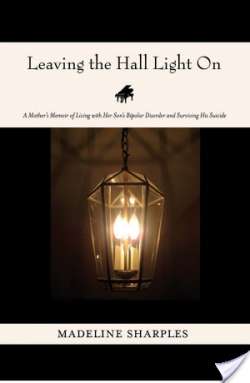
Leaving the Hall Light On charts the near-destruction of one middle-class family whose son committed suicide after a seven-year struggle with bipolar disorder. & ;& ;Madeline Sharples, author, poet and web journalist, goes deep into her own well of grief to describe her anger, frustration and guilt. She describes many attempts - some successful, some not - to have her son committed to hospital and to keep him on his medication. The book also charts her and her family's redemption, how she considered suicide herself, and ultimately, her decision live and take care of herself as a woman, wife, mother and writer.& ;& ;Highly recommended if your life has been touched by bipolar disorder or suicide, this book will also inspire you to survive other tragedies.& ;& ;"A moving read of tragedy, trying to prevent it, and coping with life after." - Midwest Book Review & ;& ;"Moving, intimate and very inspiring." - Mark Shelmerdine, CEO, Jeffers Press & ;& ;"Poetically visceral, emotionally honest. I will be a better, more empathic psychiatrist, and a better person and friend after reading this extraordinary memoir." - Irvin D. Godofsky, M.D.
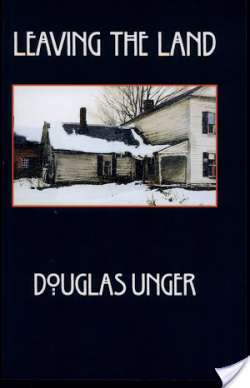
The reputation of Leaving the Land has grown steadily since its first publication in 1984. It was a finalist for the Pulitzer Prize and the Robert F. Kennedy Award and was an ALA Notable book in 1984.
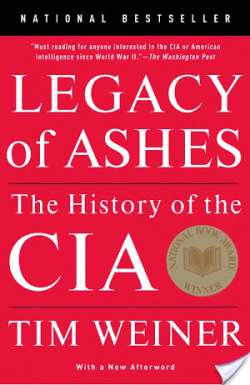
With shocking revelations that made headlines in papers across the country, Pulitzer-Prize-winner Tim Weiner gets at the truth behind the CIA and uncovers here why nearly every CIA Director has left the agency in worse shape than when he found it; and how these profound failures jeopardize our national security. From the Trade Paperback edition.
